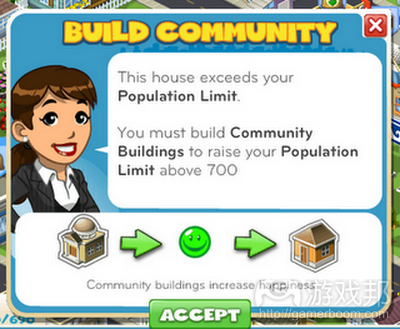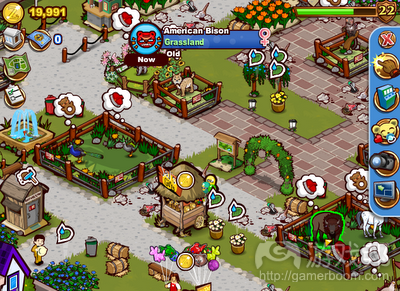阐述社交游戏的社交性所在
作者:Amanda Lange
我从没有想过玩《CityVille》,其实我怎么会玩这款游戏说来话长。不妨说是出于研究目的。
事实上我有点喜欢上这款游戏,算是最近的轻微游戏分心,我近来都没有体验那些价值60美元的硬核内容。融入泰迪熊商店和墨西哥餐厅微笑仙人掌的城市发展面貌带给我喜悦和快感。
游戏博客谈及Zynga游戏时,大多讲述它们多么不尽如人意,或它们无法称作游戏。我尊敬和钦佩的游戏设计师都不认同这个游戏类型。对于Zynga游戏的两大不满主要表现在游戏多半依靠控制,以及游戏融入过多瞎忙活任务,毫无挑战性可言。另一常见的抱怨是认为它们称不上“社交游戏”,因为它们缺乏真正的社交性。
我体验《CityVille》已有段时间,能够发现其中乐趣。我想就此发表自身看法。
在今年的GDC大会,Chris Trottier发表的“瞄准43岁妇女设计游戏”演讲博得满堂彩。其幻灯片非常有趣,主要研究游戏设计哲学。Trottier表示,“我玩游戏不希望被打扰,受阻挠,或受挑衅。”换而言之,忙碌的妈妈级玩家希望点击闪亮物体,制造悦耳声音。忙碌妈妈不想进行思考或做出困难决定。我脑子浮现的想法是,“整个群体都很幼稚。”这些玩家不希望受轻视,但你不得不鄙视她们,然后进行伪装。
所以照此看来,《CityVille》不是富有挑战性的游戏。玩家的任务是建造建筑。或给你带来营收,或增加你的人口,或让你在其他建筑中添加资源。若你没有成功建造某个特定建筑,不要担心,游戏还是能够愉快前行。
游戏依靠控制
我这张截图里的居民非常沮丧。我知道因为有出现蓝色愁容。即便居民快乐穿梭于城市当中,城市依旧保持原样。这些蓝色的面孔是在提醒我,“你的居民并不开心。”
他们为何感到沮丧。我的城市将要接近人口上限。我必须通过放置Community Buildings增加城市人口容量。有些正在建造当中,但还尚未竣工因为需要好友参与其中,Community Buildings才能最终完成。所以除非我愿意支付游戏货币跳过该环节,否则我就得向好友寻求帮助。
我可以选支付游戏货币(游戏邦注:通过现实货币进行兑换)跳过某个环节。这能够让沮丧面孔暂时消失。目前这只是权宜之计,知道我能够创建Community Building,提高上限范围,让我的城市变得不那么“拥堵”。
当然这不过是暂时之策。如果我能够提高人口上限,让居民感到开心(绿色笑脸呈现),就会有新住户涌入。这样人口上限和总人口数又会慢慢接近,再次呈现蓝色愁容,我唯有继续建造更多Community Buildings或者铲平部分拥挤公寓。
所以总的来说:愁容会不时出现在HUD,除非你掏钱或向好友求助,而这也只能暂缓燃眉之急。我丈夫听到我阐述关于悲伤面容的内容后不禁哈哈大笑。这简直就是英明至极。没有什么元素比这些出现在消息动态当中的沮丧面孔更加巧妙。它们是隐藏策略。我自认为略胜一筹,倾向从更高角度进行分析,但最终还是屈服于人类胁迫。我不希望因为城市出现愁容而增加人口,我希望出于纯粹提高人口数量目的(游戏邦注:就像《SimCity》)。游戏有其回馈,多半是因为人类都希望看到条框获得填充,看到小数目发展成大数目。
我会继续快速发展这些数目。我不可能无止境增加建筑数量。或许游戏货币减少,能量条就会减少,或者我人口上限就出现饱和,我只有进行等待。有人也许会把这视作控制,但这正是游戏的挑战之处。我知道以挑战型形容一款没有挑战性的游戏实在是不甚恰当,但你给自己设定的个人挑战是“不依靠金钱,我的城市能发展到多大?”这是个关乎规划、配置和耐心的挑战。
游戏纯属瞎忙活
但有多少内容纯属瞎忙活呢?最近曾有博文谈到此内容,通过举例《CityVille》、《FarmVille》的“收获”机制阐述无用功。是的,当我开放城市后,我需点击物品,其方能出现,接着我还需点击那些刚刚出现的物品。
瞧,当我点击我的玩具商店时,一个玩具机器人出现了,然后我需要接着点击玩具机器人。
这不是最有趣的任务。
我曾一度非常着迷《Zoo Kingdom》,但现在我只会偶然登陆我的动物园,出于维护目的。创建自己的动物园非常有趣,维持它需进行大量点击活动,当我启动我的园区,我会看到如下画面:
有很多琐碎任务需要完成。如果我一小会儿都没有点击它,我的美国野牛会变得沮丧,不再是出现不满面孔。我需要浇灌植物,从食品店收集资金,清理洗手间。我可以掏钱让这些任务消除,但完成这些任务是获得游戏货币的主要渠道,我最终不得不自己完成。所以有时我点击某动物从中获得的回馈是它最终死去,这十分令人沮丧。或许最佳举措是对其置之不理,不管其是否出现愤怒面孔。
在《CityVille》中,此类活动其实就是瞎忙活。但其实也不全是。我的游戏能量有限,所以我得在能量用尽,获得补充前,分清任务轻重缓急。这无需进行大量思考。显然,有小窗口的任务(游戏邦注:如作物枯萎前进行收割)是重要任务,而收取大建筑房租则可以等几小时。但这里需要进行少量思考,而不是盲目进行点击。我很容易将此同策略混淆。
当然点击物品也存在某些有趣阻力。Trottier将这些点击动作比作泡泡游戏。它或许会是“Skinner Box Conditioning”型回应,但我认为人类内心深处都喜欢类似点击小羊的简单活动,喜欢悦耳的声音。不论你赞同与否,这都是此类游戏获得成功的原因所在(游戏邦注:尤其是从用户不喜欢富有挑战性任务的角度考虑)。当有人表示,“这些游戏之所以成功是因为它们控制了你”,他们只说对了一半,它忽略了点击物体,制造悦耳声音以及丰富色彩同样引人入胜。创建小世界,其中玩家独自完成数百次点击活动同样非常具有吸引力。
游戏缺乏社交性
所以现在我们回到文章主题,那就社交游戏的“社交性”。社交游戏通常指Facebook游戏或者社交网络游戏,或者更确切地说,通常指条框填充型大富翁游戏。很多人都认为游戏缺乏社交性,认为将其称作社交游戏不合逻辑。
但其实游戏非常有社交性。
你将好友视作城市底部的“邻居”。你可以参观他们的城市,帮助他们,而且常需向他们寻求帮助。你或许会收到消息说你成为好友工厂的工头,你或许会看到好友头像出现,赠与你观光巴士。互相帮助过程总能够带来些许欢乐。你们成为互相帮助的好朋友。
最重要的是你们不是处在竞争状态。或许你会羡慕好友有个更大公寓或者城市规模更大,但这些都没有互相射击或拳脚相向即时互动中蕴含的高度竞争。游戏没有“袭击”活动当中的紧张感和时间紧迫感,不会形成任何不合理社交现象。
最糟结果无非是你通过墙报或通知栏惹恼好友。这个我刚体会过。(本文为游戏邦/gamerboom.com编译,如需转载请联系:游戏邦)
What’s Social in “Social Games”?
By Amanda Lange
I never intended to start playing CityVille. In fact, the reason I started playing it at all is a bit of a long story. Let’s just say, research.
Truth is I kind of like it – it’s been my mild game distraction this week, while I haven’t been picking up any of the more recent core titles that cost $60 new. There’s just something happy and cheerful about the busy little visual of my growing city, with its teddy bear store and the smiling cactus on the Mexican restaurant.
When most gaming blogs direct attention toward a Zynga title, it’s (not always, but) usually to mention how bad they are, or how they are not really games. Game designers whose work I respect and admire have basically flat-out declared games in this sphere as bad-wrong. The two main complaints about Zynga’s tycoon-lite structure are that the games are manipulative, and, that they require too much busywork that is not challenging play. Another very common complaint is that one shouldn’t call them “social games” because they are not very social.
Now that I think I’ve played CityVille long enough to find the fun in it, I think I’d like to talk about that a little.
At GDC this year Chris Trottier did a talk called “Designing Games for the 43-year Old Woman” that was given to a basically full room. (Slideshare available here.) The slides are interesting as they examine the design philosophies of the games. “When I game,” Trottier says, “I don’t want to be bothered – hassled – challenged.” To paraphrase a few of her points, busy-mom gamers want to click things that are shiny and make pleasant noises. Busy-mom gamers don’t want to have to think or make hard decisions. The thought that ran through my brain after walking out of that talk this year was “…Entire team is babies.” These gamers don’t actually want to be talked down to… but, yet, you kind of have to talk down to them, while maintaining a careful tightrope of pretending you aren’t talking down to them.
So along this vein CityVille is not a challenging game. You get goals to put down buildings. You put down buildings. Some of them increase your money, some increase your population, some allow you to fuel resources to other buildings, etc. If you don’t put down the “right” building, no worries, since it still chugs merrily along.
On Being Manipulative
The people in my city were very sad when I took this screenshot. I know because there is a little blue sad-face in the corner of my screen. It stays there, even if the people walking around within the city are smiling bright and happy. If I roll over the blue face, it reminds me. “Your people are very sad.”
Why are they sad? Well, my city is too close to reaching its population cap. I have to increase my city’s population cap by placing Community Buildings. I have several under construction, but they aren’t complete because Community Buildings can only be totally complete if they are staffed by people who are your friends. So, unless I want to pay in-game cash in order to bypass this requirement, I have to bug my friends.
I always have the option to pay in-game cash, by which I mean, the kind purchased with real-world, folding-money cash, to bypass anything. That too, would make the sad-face go away temporarily. For now, it sits, until I manage to complete a Community Building to raise the cap and make my city less “overcrowded.”
That’s only a temporary measure, of course. If I manage to raise the cap to the point where my people are really happy, as indicated by the green smiley face, new people might start moving in. Then, as they do, the gap between the cap and the total population will close again, causing blue unhappy faces until I either put down more Community Buildings or just start bulldozing crowded apartments.
So, to summarize: unhappy-face, always there looming on the HUD, unless you pay or get your friends’ help to make it go away, and then, only for a little while. My husband laughed and laughed when I explained how the little sad-face worked. It’s kind of genius. And that still isn’t as manipulative as the sad-faced little black sheep that used to show up on my Facebook feed courtesy Farmville players. They’re sneaky tactics. I like to think that I’m a little above them and analyzing them from a great height, but I really just succumb to another human pressure. I don’t want to increase my population because a frowny face appeared; I want to increase it for the pure sake of increasing it, just as one might in SimCity. It is its own reward… mostly because human animals like seeing bars fill and little numbers that start out as small and then grow in to bigger numbers.
I would just keep on increasing those numbers, rapid-fire, but the game creates a lot of different obstacles to this. I can’t just put down buildings forever. Maybe the in-game money goes down, the energy bar goes down, or my population cap is reached (causing frowny faces), and I have to wait. One might interpret this as manipulation, but it also is where the game has its challenge. I know challenge is a dirty word where it comes to a game that’s clearly so unchallenging, but the personal challenge you may set for yourself is “how big can I grow my city without spending real-world money on it?” And that becomes a challenge of planning, placement and patience.
On Busywork
But how much of that is just busywork? The What Games Are blog discussed this matter recently, specifically discussing the “harvesting” mechanic in CityVille, FarmVille etc as an example of needless work. So, yeah, when I get my city open, I have to click on stuff to make stuff pop out and then I click on the stuff that just popped out.
Look, when I clicked on my toy shop a toy robot popped out of the toy shop and now I have to click the toy robot.
…Okay, so, that’s not really the most fun thing to do.
I used to be fairly enamored with Zoo Kingdom, but now I only visit my zoo every once in a while, and this kind of upkeep is basically the reason. Building my zoo was fun. Maintaining it involves a lot of clicking on stuff, so when I boot up my zoo now I see this:
Lots of little things to do. My American Bison is really upset that I haven’t clicked on it in a while, and it’s making something way beyond a frowny face. And I gotta water the plants and collect the money from food stalls and muck out the restrooms. I can pay money in-game to make many of those tasks go away, but since doing the tasks is my main source of in-game money, I have to do them eventually. Also, sometimes, my reward for clicking on an animal is that it dies, which is really quite depressing. Maybe best just to let it live in limbo, angry-face or no.
In CityVille, this sort of activity is in fact busywork. But… not entirely. Since I have a limited amount of “energy meter” when I fire up the game, I have to prioritize what’s best to do first before it runs out and gets a chance to recharge. This doesn’t involve a lot of thought. Obviously, anything with a small window, such as harvesting crops before they wilt, is important to prioritize, while collecting “rent” on a large building can wait a few hours. But there’s a small amount of thought involved here that makes it not just mindless clicking on stuff. My 4 PM low-blood-sugar brain will happily confuse that for strategy.
Also, there is a certain pleasant friction to clicking on stuff (and having stuff pop out of it). Trottier likened these little click actions to popping bubble wrap. It could also be referred to as a “Skinner Box Conditioning” type of response, but I think there is something inside of any human that enjoys the simple act of Clicking a Cow and having it make a cheerful noise. Like it or not, that’s probably one reason why these games succeed as much as they do, especially with audiences that don’t really want significant challenge. When people say things like “these games are only successful because they manipulate you,” they may be half-right, but it kind of ignores the fact that clicking on something and having it make happy noises and bright colors is appealing. Building a little world that you made on your own in the process of those hundred little clicks is also appealing.
But It’s Not Social
So now I come to the actual topic I titled this post about, which is, the “social” aspect of a “social” game. The category of “social games” basically refers to “Facebook games” or games on a social network, and more specifically it usually means little bar-filling tycoon games like this one. And a lot of blogs argue that it’s not social, so it’s silly to call them social games.
But, you know, it’s social enough.
You see your friends as “neighbors” at the bottom of your city. You can visit their cities and help them, and you often must entreat them to help out with yours. You may get a message that you were made foreman of your friend’s factory, or you might see a little icon that represents your friend hopping around sending tour buses to your businesses. Each time this happens there is a small moment of delight, that you are helping that person, or that person is helping you. You are friends being friendly with each other.
And best of all, you’re not in much competition. Maybe you’re jealous that your friend was able to get a bigger apartment building or is a higher city level, but it’s not the highly competitive real-time interaction of shooting at one another or throwing punches at one another. It’s also not stressful and time-sensitive social pressure like running a “raid,” and it’s engineered to be very difficult to cause any undue social drama. (Though, it probably has to someone, because, just about anything that involves more than one person can.)
About the worst you can do is annoy your friends with your wall posts and alerts. Which I might have done this week a little.
But if you’ll now excuse me I think it’s time to collect the daily moneys from my City Hall. You should stop by and visit some time. It’s kind of blissfully dull there, but probably not as outright evil as it’s sometimes made out to be. (Source:blogspot)










































 闽公网安备35020302001549号
闽公网安备35020302001549号